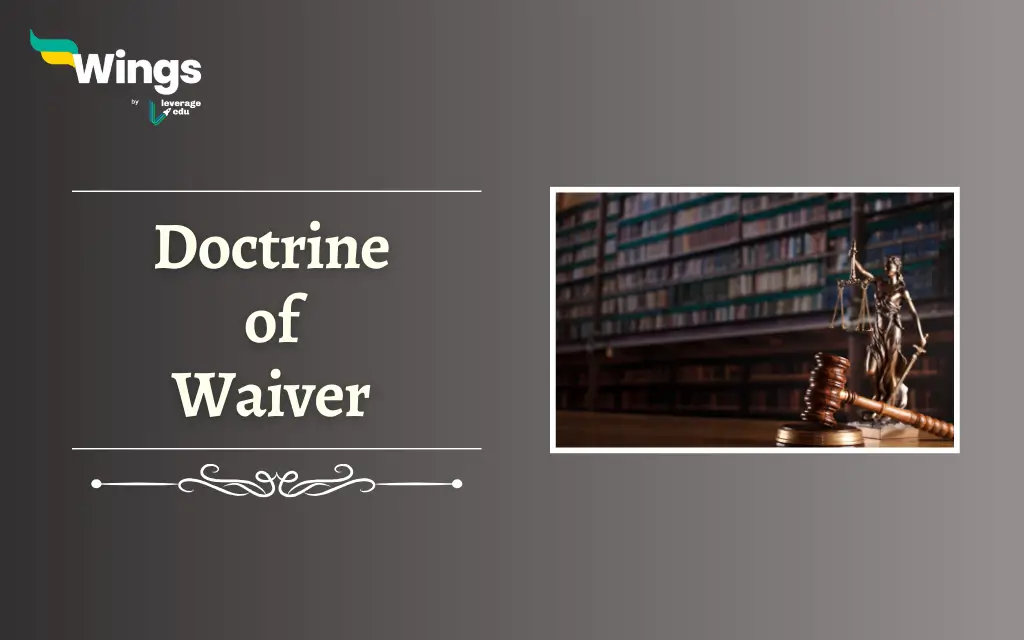Under the Doctrine of Waiver, a person acknowledged as having a right or a privilege is at liberty to give up or waive off that right. However, this is known to be a voluntary waiver of the rights or the privilege. Read on to learn about the Doctrine of Waiver, its position in India, and important judgements that come under the Doctrine of Waiver.
Also read: The Basic Structure Doctrine: Safeguarding Constitutional Integrity
Meaning of Doctrine Of Waiver
A Waiver means giving up a right on purpose. It is when someone chooses to abandon a legal advantage, benefit, claim, or privilege they could otherwise have.
- In simpler terms, the Doctrine is like agreeing not to use a right.
- However, for a waiver to be valid, the person giving it up needs to be fully aware of their rights and intentionally choose to relinquish them.
- Moreover, it is important to take into consideration that this waiver does not apply to the Fundamental Rights in India.
- This means that a Citizen of India cannot waive off their Fundamental Rights.
- Whereas in the United States of America, any citizen can use this Doctrine of Waiver and waive off their Fundamental Rights.
Do Remember!
In India, the Doctrine of Waiver is not applicable, which means that we follow the Doctrine of Non-waiver.
Also read: What is the Nuclear Doctrine of India?
Doctrine Of Waiver in India
The Supreme Court of India has made many observations regarding the Doctrine of Waiver, they are as follows:
- The Fundamental Rights are mandatory for every citizen of the country.
- To maintain the objectives that are mentioned in the Preamble of our Indian Constitution. Moreover, no citizen can waive off the Fundamental Rights.
- Moreover, this Doctrine was designed and implemented by some of the American judges back in America. This means that they cannot be obligated or implemented under our Constitution.
- In our Constitution, Fundamental Rights are not implemented just for individual rights and benefits.
- Ultimately, they come into action when we talk about individual rights.
- The Doctrine of Waiver comes into consideration under the umbrella of Public Policy.
- According to Articles 15(1), Article 20 and Article 21, a citizen cannot be discriminated against by telling the State that “You can discriminate” or by waiving off the protections given under Articles 20 and 21.
- Since India is a socially, economically, and educationally new democracy.
- It is considered the duty of the Supreme Court of India to protect the Fundamental Rights of the citizens.
Also read: What is the concept of the Gujral Doctrine?
Noticeable Judgements under The Doctrine of Waiver
The table below highlights some of the important Cases and their judgements under the Doctrine of Waiver:
| Judgements under the Doctrine of Waiver | |
| Case with year | Judgement by the Supreme Court |
| Behram Khurshld Peslkaka vs. State of Bombay (1954) | Under criminal prosecution, the Fundamental Rights of an accused person cannot be waived, and they cannot be convicted. |
| Basheshar Nath vs. Commissioner of Income Tax (1958) | The Supreme Court rejected the contention of the respondent that the petitioner, by voluntarily agreeing to pay the tax, had waived his Fundamental Right guaranteed under Article 14. It upheld the contention of the petition, holding that the Fundamental Rights could not be waived. |
| Olga Tellis vs. Bombay Municipal Corporation (1985) (Popularly known as the Pavement Dwellers case) | It held that a person cannot waive any of the Fundamental Rights conferred upon him by any of his acts, and there cannot be any obstruction against the Constitution. It asserted that the purpose that the Constitution seeks to achieve by conferring Fundamental Rights Is not only to benefit the individual but to secure the larger interests of the community. |
| Nar Singh Pal vs. Union of India (2000) | It reiterated that the Fundamental Rights under the Constitution cannot be bartered away. It also ensured that Fundamental Rights were not compromised. |
Related Blogs
| What was the Policy of the Doctrine of Lapse, Impact and More | Who Abolished the Doctrine of Lapse, Timeline and More |
| Who Introduced The Doctrine Of Lapse? | What is Doctrine of Severability? |
| Difference between Doctrine of Eclipse and Severability | What is the Difference between Fundamental Duties and Directive Principles? |
| What is Universal Adult Franchise? | What is the Difference Between Fundamental Rights and Fundamental Duties? |
FAQs
No, individuals in India cannot waive their Fundamental Rights under the Doctrine of Waiver. The Supreme Court has consistently upheld that Fundamental Rights are mandatory and cannot be voluntarily ignored by citizens. As they are essential for upholding the objectives outlined in the Constitution’s preamble.
In India, the doctrine of non-waiver prevails, meaning that Fundamental rights cannot be waived. This contrasts with the Doctrine of waiver observed in some other jurisdictions around the world. Such as the United States, where people may have the option to waive certain rights. The doctrine of non-waiver underscores the non-negotiable nature of fundamental rights in India.
No, there are no exceptions to the principle of non-waiver of Fundamental rights in India. The Supreme Court has consistently affirmed that Fundamental rights are sacred. Moreover, they cannot be compromised or waived by individuals, regardless of any circumstance. Any attempt to waive fundamental rights would be considered contrary to public policy and unconstitutional.
Lastly, we hope you liked our blog and gained an understanding of the Doctrine of Waiver in India. Moreover, you may even read more blogs and empower yourself with knowledge regarding Civics and Polity!


 One app for all your study abroad needs
One app for all your study abroad needs












 60,000+ students trusted us with their dreams. Take the first step today!
60,000+ students trusted us with their dreams. Take the first step today!